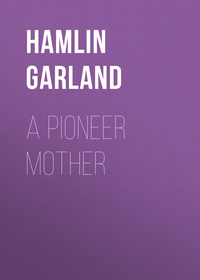Buch lesen: "A Pioneer Mother"
SHE was neither witty, nor learned in books, nor wise in the ways of the world, but I contend that her life was noble. There was something in her unconscious heroism which transcends wisdom and the deeds of those who dwell in the rose-golden light of romance. Now that her life is rounded into the silence whence it came, its significance appears.
To me she was never young, for I am her son, and as I first remember her she was a large, handsome, smiling woman – deft and powerful of movement, sweet and cheery of smile and voice. She played the violin then, and I recall how she used to lull me to sleep at night with simple tunes like “Money Musk” and “Dan Tucker.” She sang, too, and I remember her clear soprano rising out of the singing of the Sunday congregation at the schoolhouse with thrilling sweetness and charm. Her hair was dark, her eyes brown, her skin fair and her lips rested in lines of laughter.
Her first home was in Greene’s Coolly, in La Crosse County, Wisconsin, and was only a rude little cabin with three rooms and a garret. The windows of the house overlooked a meadow and a low range of wooded hills to the east. In this house she lived alone during two years of the Civil War while my father went as a volunteer into the Army of the Tennessee. My memory of these times is vague but inset with charm. Though my mother worked hard she had time to visit with her neighbors and often took her children with her to quilting bees, which they enjoyed, for they could play beneath the quilt as if it were a tent, and run under it for shelter from imaginary storms. I feel again her strong, soft, warm arms as she shielded me at nightfall from menacing wolves and other terrible creatures. When the world grew mysterious and vast and thick-peopled with yawning monsters eager for little men and women, she gathered us to her bosom and sang us through the gates of sleep into a golden land of dreams. We never knew how she longed for the return of her blue-coated soldier.
Our stove was a high-stepper, with long bent legs, and bore its oven on its back as a dromedary his hump. Under its arch I loved to lie watching my mother as she trod to and fro about her work in the kitchen. She taught me to read while working thus – for I was constantly interrupting her by asking the meaning of words in the newspaper which I had smuggled under the stove beneath me.
MY father’s return from the war brought solace and happiness, but increased her labors, for he set to work with new zeal to widen his acres of plow-land.
I have the sweetest recollections of my mother’s desire to make us happy each Christmas-time, and to this end she planned jokes for herself and little surprises for us. We were desperately poor in those days, for my father was breaking the tough sod of the natural meadows and grubbing away trees from the hillside, “opening a farm,” as he called it, and there was hardly enough extra money to fill three stockings with presents. So it came about that mother’s stocking often held more rags and potatoes than silks or silverware. But she always laughed and we considered it all very good fun then. Its pathos makes my heart ache now.
She was a neighborly woman. She had no enemies. I don’t believe any one ever spoke an unkind word of Belle Garland as she was called – she was always sunny – her little petulances passed quickly like small summer showers and then she laughed – shook with laughter while the tears shone on her face. I can see now that she was only a big, handsome girl, but she was my mother, and as such seemed an “old person.”
Her physical strength was very great. I have heard my father say that at the time he went away to war she was his equal in many contests, and I know she was very deft and skillful in her work. She could cut and fit and finish the calico dress purchased in the morning of the same day. She cooked with the same adroitness, and though her means were meagre everything she made tasted good. She liked nothing better than to have her neighbors drop in to tea or dinner.
